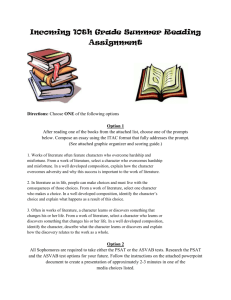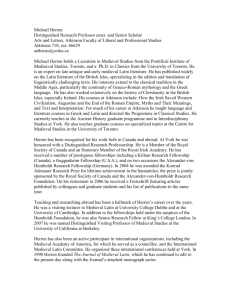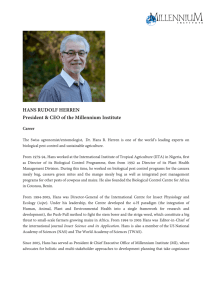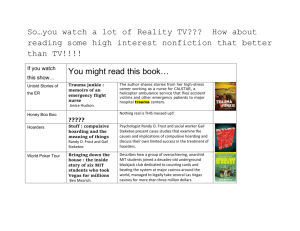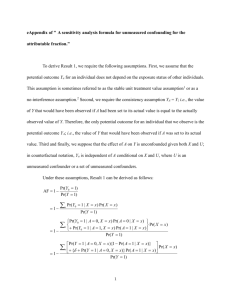hans rudolf herren/ biovision foundation
advertisement
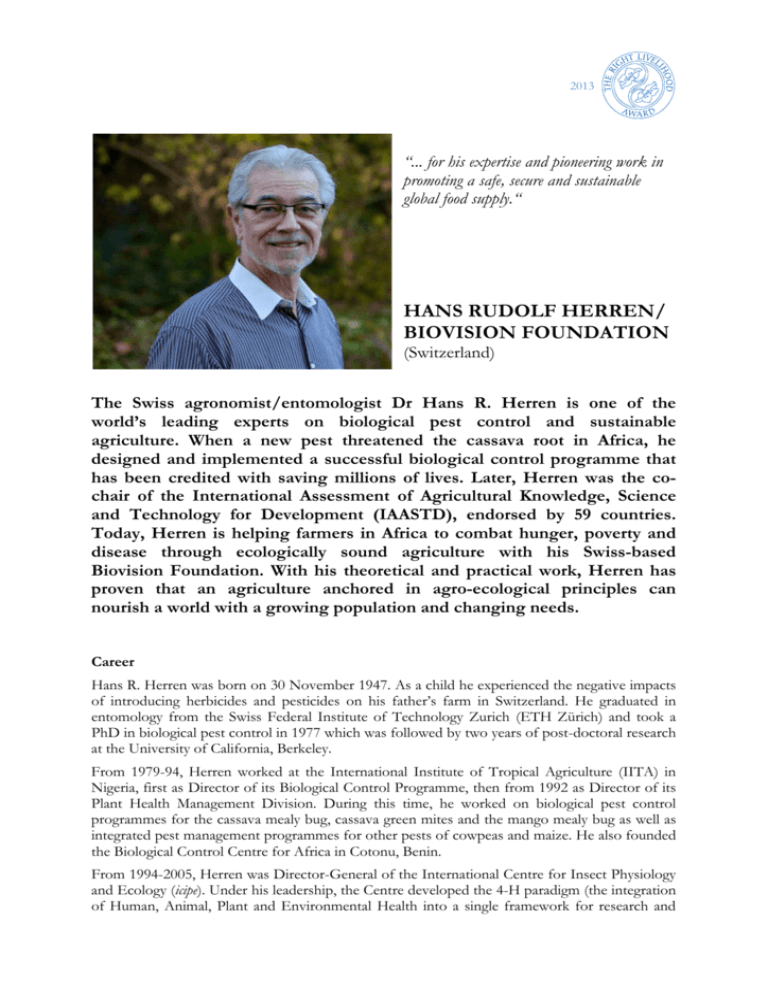
2013 “... for his expertise and pioneering work in promoting a safe, secure and sustainable global food supply.“ HANS RUDOLF HERREN/ BIOVISION FOUNDATION (Switzerland) The Swiss agronomist/entomologist Dr Hans R. Herren is one of the world’s leading experts on biological pest control and sustainable agriculture. When a new pest threatened the cassava root in Africa, he designed and implemented a successful biological control programme that has been credited with saving millions of lives. Later, Herren was the cochair of the International Assessment of Agricultural Knowledge, Science and Technology for Development (IAASTD), endorsed by 59 countries. Today, Herren is helping farmers in Africa to combat hunger, poverty and disease through ecologically sound agriculture with his Swiss-based Biovision Foundation. With his theoretical and practical work, Herren has proven that an agriculture anchored in agro-ecological principles can nourish a world with a growing population and changing needs. Career Hans R. Herren was born on 30 November 1947. As a child he experienced the negative impacts of introducing herbicides and pesticides on his father’s farm in Switzerland. He graduated in entomology from the Swiss Federal Institute of Technology Zurich (ETH Zürich) and took a PhD in biological pest control in 1977 which was followed by two years of post-doctoral research at the University of California, Berkeley. From 1979-94, Herren worked at the International Institute of Tropical Agriculture (IITA) in Nigeria, first as Director of its Biological Control Programme, then from 1992 as Director of its Plant Health Management Division. During this time, he worked on biological pest control programmes for the cassava mealy bug, cassava green mites and the mango mealy bug as well as integrated pest management programmes for other pests of cowpeas and maize. He also founded the Biological Control Centre for Africa in Cotonu, Benin. From 1994-2005, Herren was Director-General of the International Centre for Insect Physiology and Ecology (icipe). Under his leadership, the Centre developed the 4-H paradigm (the integration of Human, Animal, Plant and Environmental Health into a single framework for research and 2013 development), the Push-Pull method to fight the stem borer and the striga weed, which constitute a big threat to small-scale farmers growing maize in Africa. From 1994 to 2005 Herren was Editor-in-Chief of the international journal Insect Science and its Application. Herren is also a member of the US National Academy of Sciences (NAS) and The World Academy of Sciences (TWAS). Saving millions of lives with the world’s biggest biological pest-control programme Cassava was imported to Africa from South America in the 16th century and is currently being grown in around 40 African countries. Up until the 1970s it had very few enemies or pests in Africa, evolving to one of the continent’s main staple crops, making up a great part of daily nutrition for about 200 million Africans. In the 1970s, however, the mealy bug was accidentally imported to the African continent and, as a pest of the cassava root, expanded rapidly across Africa, threatening the survival of millions of people. The spraying of pesticides, initiated by the affected governments, did not prove to be successful and if expanded across the continent would have had dire consequences both on people and the environment, while not providing a lasting solution to the problem. Herren was hired by the International Institute of Tropical Agriculture (IITA), based in Nigeria, to develop an alternative approach. To this end, he developed the Africa-wide Biological Control Programme, built up an international coalition and secured the funding to fight the cassava mealy bug by natural means. With the help of this worldwide network, the natural enemy of the mealy bug, a parasitic wasp, was identified in Paraguay. After further research, Herren began rearing the wasp first under quarantine conditions while testing for safety and efficacy. Once it had been ascertained that the wasp would not turn itself into a problem for the African agro-ecosystem, he began one of the biggest release campaigns in human history. Some 1.6 million wasps were released between 1982 and 1993, from a specially equipped low-flying airplane as well as on the ground, in 24 countries in the cassava belt, from Senegal to Angola. The programme re-created the natural balance between the mealy bug and its natural enemy, thus ensuring a sustainable and long-term solution of the mealy bug problem. It has been estimated by the World Food Prize that the programme saved the lives of 20 million people. According to Right Livelihood Award Laureate (1993) Vandana Shiva, “there has never been a programme with as high an impact on food and nutrition security in such a short, effective, socially and environmentally sound way”. Co-Chairing the International Assessment of Agricultural Knowledge, Science and Technology for Development (IAASTD) In 2004, Herren became Co-Chair of the International Assessment of Agricultural Science and Technology for Development (IAASTD). Like the IPCC in the field of climate science, the IAASTD was an intergovernmental process, under the co-sponsorship of the FAO, GEF, UNDP, UNEP, UNESCO, the World Bank and WHO. It evaluated the relevance, quality and effectiveness of agricultural knowledge, science, and technology with respect to meeting development and sustainability goals of reducing hunger and poverty, improving nutrition, health and rural livelihoods, and facilitating social and environmental sustainability. The results were agreed by 400 scientists and endorsed by 59 governments at a plenary meeting in Johannesburg in 2008 and published in a report series “Agriculture at a Crossroads” in 2009. 2013 The report emphasises the need for higher productivity and more equal distribution of agricultural products and recommends organic agriculture and agro-ecological practices as the way forward that will ensure the long-term productivity of the soil and a multifunctional agriculture. The report argues the urgency of putting this new paradigm in place without further delay and that ‘business as usual’ is no longer an option because the current agricultural systems, based on exploitation of non-renewable natural resources and external inputs, endanger global food production in the medium and long term. The report also emphasises the need to bring farmers, and in particular women, into the research and extension cycle. However, ‘developed’ countries have since shown little willingness to implement the IAASTD report’s findings, which Herren attributes to the report’s critical position on trade liberalisation for agricultural products, and its doubts on the potential of genetic engineering to solve the key problems of hunger and poverty. The problem, says Herren, is “the vested interests of a few corporations and large farmers that work against the only sensible solutions”. Even though the IAASTD secretariat has now been dissolved, Herren, together with his Biovision Foundation and an alliance of over 140 international NGOs, is advocating for the implementation of the report’s results – a subject on which he has given more than 250 speeches. Herren’s goal is that the FAO, with the support of the Committee on World Food Security (CSF), should get a mandate to implement the IAASTD findings. He lobbies for the establishment of a permanent body to regularly review agricultural science, knowledge and technology for development and aims to build up a strong alliance on the policy level pushing for sustainable agriculture. Biovision Foundation In 1998, Herren founded the Biovision Foundation for Ecological Development with the mission to combat hunger and poverty at their roots and to disseminate ecological methods that sustainably improve living conditions in Africa. Today, Biovision has almost thirty projects in Eastern Africa (Kenya, Ethiopia, Tanzania, Uganda) and Switzerland. Its budget of around CHF 7 million is financed by over 35,000 donors: individuals, foundations, Swiss state bodies and businesses. Biovision works on the ground in Eastern Africa to improve small-scale farmers’ livelihoods by transmitting scientifically-based knowledge and methods of ecological farming. At the core of these projects is the Farmer Communication Programme, which disseminates vital information to smallholders. It uses different channels such as a farmers’ newspaper (over 240,000 farmers reached), a radio show (up to four million listeners every week), an internet platform (www.infonet-biovision.org with over 30,000 hits a month) and SMS services to effectively communicate ecological methods to farmers all over East Africa. In addition, Biovision works on advocacy projects with the goal to change policies and raise awareness among consumers and the broad public. These projects advocate a general shift in paradigm in international agricultural policies by implementing the IAASTD report and inform Swiss consumers about the ecological and social impact of their consumption patterns. Other roles Since 2005, Herren has been president of the Millennium Institute in Washington D.C., which helps decision makers understand the interconnectedness between economic, social, environmental factors, and issues of peace and security. The institute offers a variety of tools and 2013 advisory services to governments and the private sector that enable holistic long-term planning, while taking into account the existing environmental, social and economic boundaries. Herren has won a number of awards, including the World Food Prize (1995), the One World Award from Rapunzel (2010) and the Tyler Prize for Environmental Achievement from the University of Southern California (2003). Herren lives in Washington D.C., Rome, and California where he has a vineyard he is managing according to organic agriculture principles. He is a citizen of Switzerland. Quote by Hans R. Herren: “The conversation on food and nutrition security needs to move away from costly silver bullets to affordable, realistic and tested solutions that are inclusive, link farmers’ knowledge with sustainable innovations and reconnect the consumers with the producers.” Contact details Biovision David Fritz, Head of Communications and Campaigns Zürich Switzerland Phone: +41-44-500 49 84 Cell Phone: +41-79-312 84 13 www.biovision.ch
